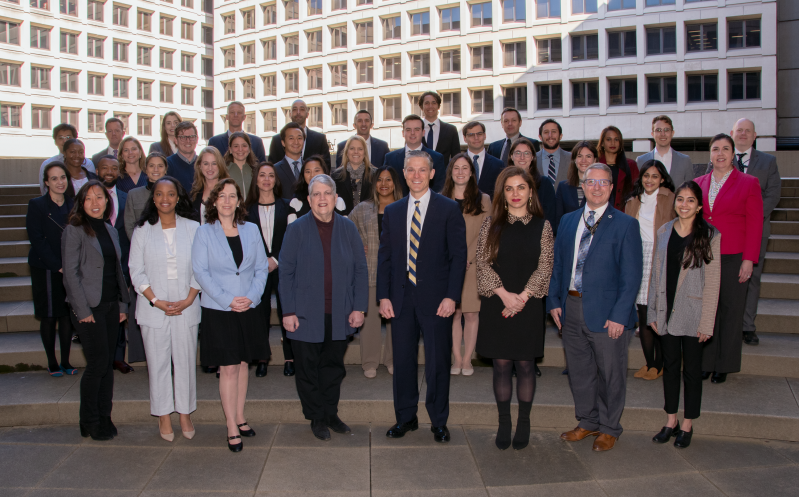April 18, 2023
Pictured with the UC Berkeley student and staff delegation, bottom row, fourth from left: Professor Janet Napolitano; to her right, Robert Brown, FBI Executive Assistant Director of Science and Technology; to her left, Katie Noyes, FBI Section Chief.
Talia Smith (MPP ’23) will never forget what it felt like to walk into CIA headquarters in Langley, Virginia. One of the most secretive and mysterious organizations in the world, its headquarters are seldom seen by the public eye. The chance to visit is a rare and exciting experience, offering a behind-the-scenes look at one of the most important organizations in the world.
Smith visited the CIA, and other agencies that play a critical role in maintaining national security, with former secretary of homeland security and Goldman School of Public Policy Professor Janet Napolitano as part of the inaugural Immersion Week offered by Goldman to students at UC Berkeley.
“This week was truly unparalleled to anything I’ve done across these past two years in grad school,” said Smith. “The access to the agencies and the time and dedication given to us Berkeley students was unlike anything else I’ve gotten from my time at UCB. I hope this opportunity continues for future students; if it does, I have no doubt that many more students will be pursuing public service careers in security and intelligence.”
The trip connected students to industry representatives, academics, and policymakers in the Department of Homeland Security (DHS), the FBI, and the CIA, among others. Students yielded insights from policy makers and senior officials, taking part in a full week of meetings, panels, and visits at government headquarters. The content was focused on security policy; how security issues are mitigated and handled by security professionals across industries; and how security threats to our democracy and infrastructure can be better managed and addressed across sectors in Washington D.C. and abroad.
Professor Napolitano, who served as governor of Arizona and Secretary of Homeland Security to President Barack Obama, reached out to her personal and professional colleagues to organize the week and develop the curriculum.
“The DC immersion week is an opportunity for GSPP students to experience government work at the highest level,” Napolitano said. “By taking them out of the classroom and giving them access to the national security agencies and real-world practitioners and public servants protecting our country, they learn things they could never absorb from a book or a policy paper.”
In addition to visiting various government agencies and private practices, students participated in the Uncommon Table, an initiative built by the Center for Security in Politics and American University’s Sine Institute of Policy and Politics. Held at American University, the dinner brings together disparate voices and explores how we can create common ground to reconnect Americans to a renewed sense of trust in each other and our democracy. The panel for the evening, moderated by Napolitano, featured Richard Fontaine, CEO, Center for a New American Security; and Cornell Belcher, President, Brilliant Corners Research and Strategies.
“Each student came out of the week with a greater appreciation for the breadth and depth of what it means to work in national security and a desire to contribute their talents to public service,” said Napolitano. “It is a deeply impactful and important experience to offer students at UC Berkeley, and I hope I can continue to develop this type of experiential learning with the support of GSPP and its broader community.”
During the week, the students met with top administration officials and private practice executives to learn about the policy-making process on high-priority issues in security. The week concluded with onsite crisis simulation exercises at the National War College.
The trip is the first field immersion that emphasizes experiential learning, collaboration with elite companies and agencies, and networking with high-level business and policy experts. If funding allows, the goal is to continue to offer these immersions at least once per year for students.
“Our students deserve opportunities to hear from those at the front lines of public policy making and implementation; this allows them to test their preparedness for changemaking,” said Goldman Dean David C. Wilson, who provided the financial support to make the week happen. “The D.C. vision was successful because of collaboration. We connected our best and brightest students with our influential faculty and talented staff, and then set them loose in the most powerful policy and politics laboratory in the world. This type of innovation produced a transformational experience that characterizes what makes the Goldman School special. I am proud to have supported it and I look forward to providing more experiences like these for our students.”
The desire to continue the Immersion Week for other cohorts is palpable among students who participated. Not only is the content and networking beyond compare, but the broader understanding of national security issues is transformative.
“The Immersion Week was, with no exaggeration, a life-changing experience. Due to the tireless work and patriotism of the intelligence community, most Americans go through their lives never understanding the national security threats our country faces on a daily basis and the work that goes into anticipating and responding to those threats,” said Charlotte Aaron (JD/MPP ‘24). “I had little appreciation for not only the threats we face but also the work that goes on within federal agencies and departments to combat those.
“The trip to D.C. opened a whole new world of potential career paths and policy areas to engage with and think critically about. It was a unique and exceptionally rewarding experience that only Professor Napolitano could provide.”
This article originally appeared on the Goldman School of Public Policy website.

